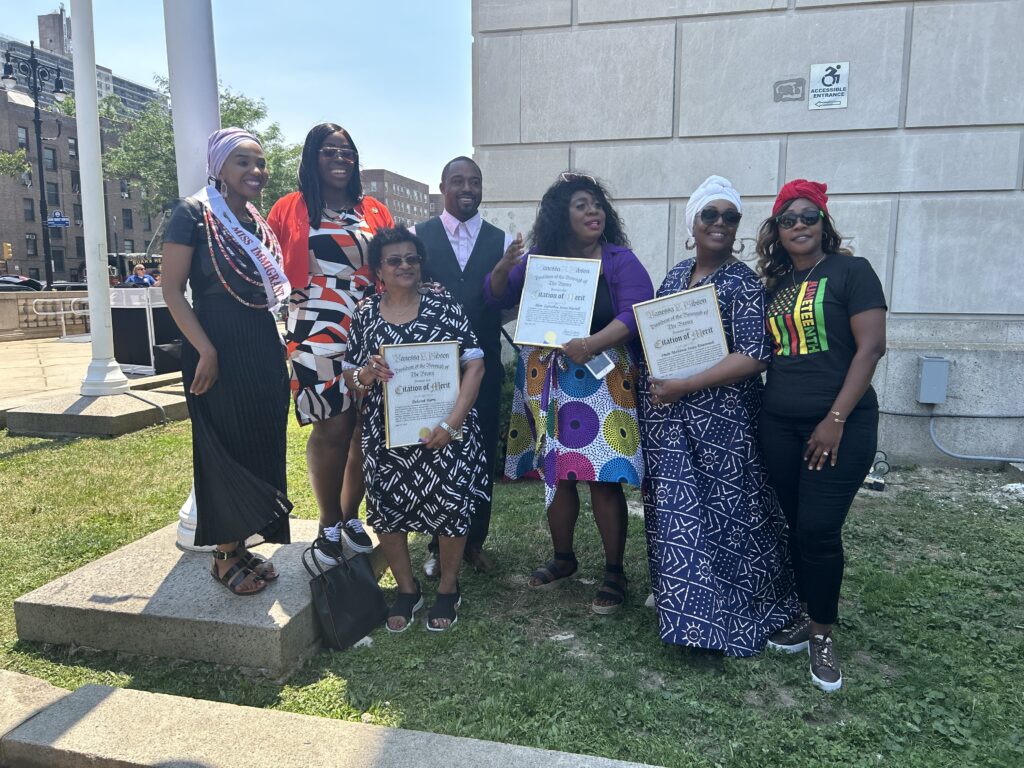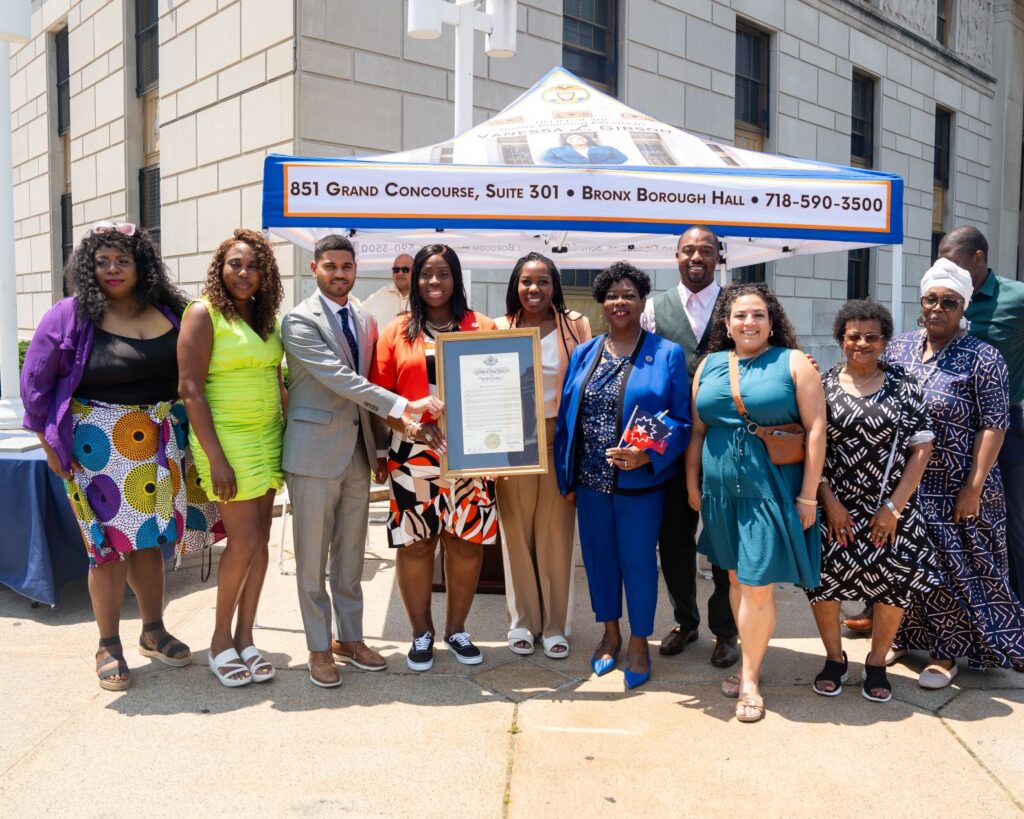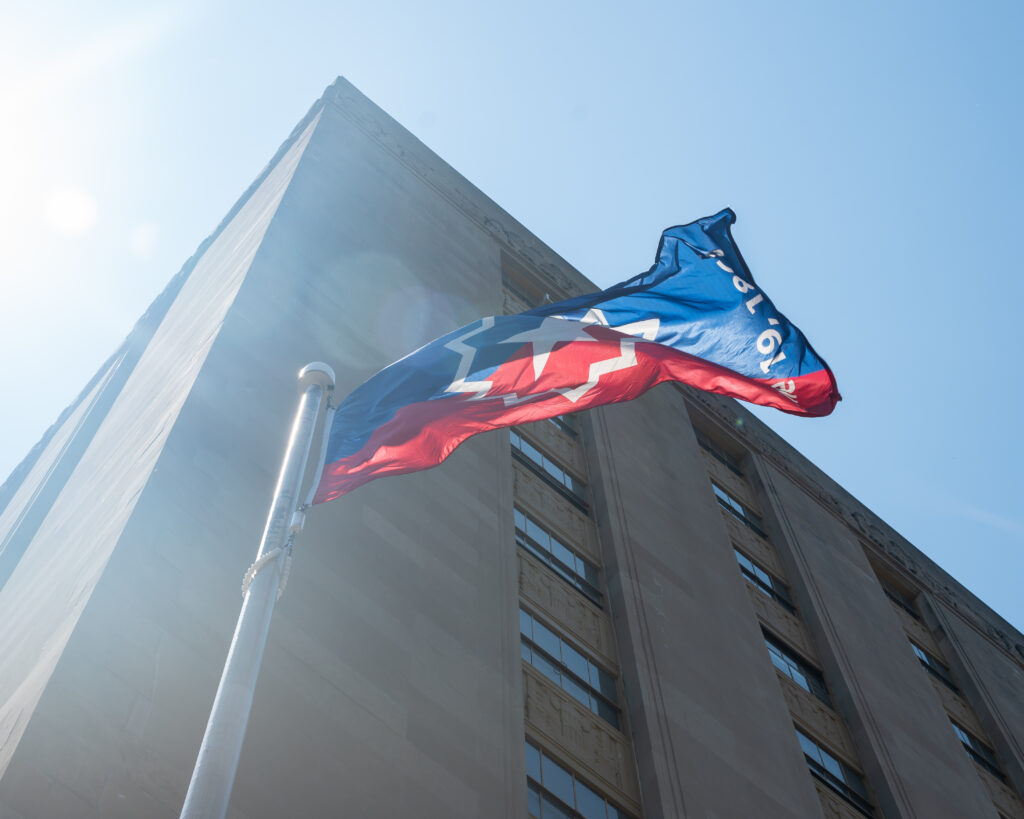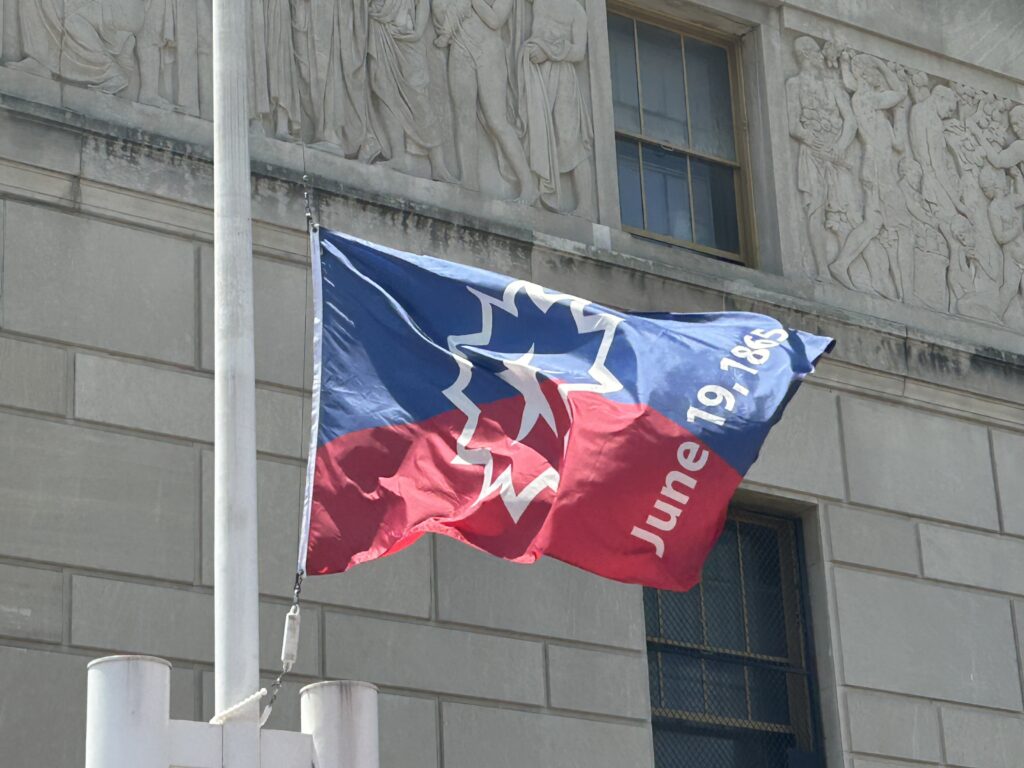
Photo courtesy of the Office of the Bronx Borough President
Bronx Borough President Vanessa L. Gibson hosted the annual Juneteenth flag-raising celebration outside Borough Hall located at 851 Grand Concourse on Tuesday, June 18. Signed into law on May 17, 2021, by U.S. President Joe Biden, Juneteenth is celebrating its 3rd year as an official U.S. holiday commemorating the end of slavery in Texas and the United States.
Representing the history and freedom of Africans and African-American enslaved people and their descendants, the Juneteenth flag’s red, blue, and white colors are deeply significant, representatives of the borough president’s office said.
They explained that the star in the center surrounded by a starburst expresses a new beginning, a new freedom, and a new people interwoven into American history and life.
They said the arc colored in red pays homage to those who suffered and died for the cause of freedom, while the blue is for the hope that still stands on the horizon for all Americans.

Fidel Malena, Bronx regional representative from the New York executive chamber, Bronx Borough President Vanessa L. Gibson, Debbie Esther Louis, M.S.
director of NYC intergovernmental affairs for the executive chamber, Bronx District Attorney Darcel Clark, State Assembly Member Landon C. Dais (A.D. 77),
State Sen. Nathalia Fernandez (A.D. 34), Deborah Harris, retired principal and lifelong member of the NAACP, Iman Mahàwa Sesay Drammeh, multi-disciplined artist, researcher, and award-winning documentarian, and Sudoku Donzo, chairman of the African Advisory Council attend a flag-raising ceremony to mark Juneteenth at Bronx Borough Hall on Tuesday, June 18, 2024.
Photo courtesy of the Office of the Bronx Borough President
Debra G. Tirado, president of Bridgefield Civic League, served as the ceremony’s emcee. This year’s honorees were retired principal and lifelong member of the NAACP, Deborah Harris; multi-disciplined artist, researcher, and award-winning documentarian, Iman Mahàwa Sesay Drammeh; and founder of the Sierra Leone Nurses Association, The Honorable, Zainabou Sesay Harrell.
Spoken word artists from Bronx Poetry performed before and after the official raising of the Juneteenth Flag with original works celebrating the African-American experience and its impact on American culture.
Meanwhile, Linda Tigani, chair and executive director of the Commission on Racial Equity (CORE) released the following statement in commemoration of Juneteenth.
“Today, I am reflecting on the African American community’s work to be free. Protecting and promoting human and civil rights and freedoms as a daily practice grounded in community power, and fierce commitment to racial equity and social justice.
Juneteenth commemorates when word of the Emancipation Proclamation, first issued by President Lincoln in September of 1862 and effective January 1863, reached Texas – two years later – on June 19, 1865.

Photo courtesy of the Office of the Bronx Borough President
“Although the commemoration of Juneteenth as a federal holiday is important, its symbolic nature does not undo the centuries of violence and injustice African Americans have endured. In an echo of the brutal backlash after Emancipation, we are currently experiencing a rollback of human and civil rights and freedoms.
Education, policing, housing, and access to health care are some but not all the systems that continue to evoke racial harm and injustice. Now, as at the dawn of emancipation, African Americans and oppressed communities won’t truly experience freedom until bias and discrimination is uprooted from government operations and community voices are heard and included in government decision making.
Ending racism sits at the forefront of the NYC Commission on Racial Equity (CORE)’s work. We are chartered as an independent commission to hold NYC government accountable to advancing racial equity in government operations and increasing community voice in government decision making. By appropriately funding new ways of working, government can begin to redress the harm of long-term disinvestment that will bring out equity and justice.
The New York City’s Charter, also knowns as our city constitution, begins with a preamble that calls on government to recognize and uplift the history of our city and nation and honor our community members who have suffered and died in the name of freedom. The preamble establishes NYC as a multiracial democracy where our policies, programs, and investments must be influenced by the collective voices of communities most harmed by racism and oppression to dutifully serve the people of NYC. Excerpts from NYC Preamble leading the call.
‘We acknowledge the grave injustices and atrocities that form part of our country’s history, including the forced labor of enslaved Africans, the colonialism that displaced Indigenous people from their lands, the devaluing and underpaying of immigrant workers, and the discrimination, racial segregation, mass incarceration, and other forms of violence and systemic inequity that continue to be experienced by marginalized groups, including, but not limited to, Black, Indigenous, Latinx, Asian, Pacific Islander, Middle Eastern, and other People of Color, women, religious minorities, immigrants, people who are LGBTQ+, and people with disabilities.

Photo courtesy of the Office of the Bronx Borough President
We also recognize that these systemic injustices are at the foundation of so many of society’s structures and institutions, and have caused profound physical, emotional, social, and psychological harm and trauma to individuals, families, and communities.
We, the people of New York city, united in our resolve to build a just and equitable city for all, recognize the efforts of those New Yorkers, past and present, who fought for racial equity and social justice, honor the contributions of those New Yorkers who have suffered in the name of freedom, and acknowledge all who fought, struggled, and dreamed for a better life and a better city. Together, we stand on their shoulders as we move boldly toward a brighter tomorrow for ourselves, our children, and future generations.’
Protecting and promoting human and civil rights and freedoms is a daily practice grounded in community power, and fierce commitment to racial equity and social justice. Although the commemoration of Juneteenth as a federal holiday is important, its symbolic nature does not undo the centuries of violence and injustice African Americans have endured. By appropriately funding new ways of working, government can begin to redress the harm of long-term disinvestment that will bring out equity and justice.”
A Juneteenth celebration takes place at Van Cortlandt House Museum on June 19, at 6 p.m., hosted by Van Cortlandt Park Alliance and Bronx Arts Ensemble. Click here for more details.
The program will begin on the lawn of the Van Cortlandt House Museum with performances, including music and spoken word. Then, there will be a procession with drums to the Enslaved African Burial Ground for a libation ceremony, honoring the memory of the enslaved people.
Guest artists include renowned drummer Baba Don Babatunde, actress Ashley Hart Adams, violist Judith Insell, mezzo-soprano Lucia Bradford and the NYC All City High School Chorus, poet David Mills and West African drummer Yahaya Kamate. An RSVP is suggested.
Vehicles are not allowed to drive into the park. Parking available at Van Cortlandt Golf House or street parking.




